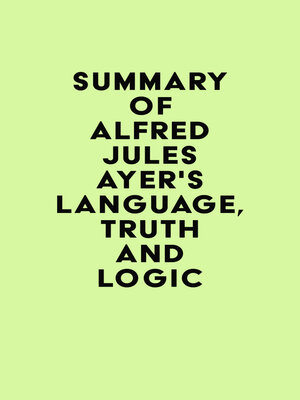
Sign up to save your library
With an OverDrive account, you can save your favorite libraries for at-a-glance information about availability. Find out more about OverDrive accounts.
Find this title in Libby, the library reading app by OverDrive.



Search for a digital library with this title
Title found at these libraries:
| Loading... |
Please note: This is a companion version & not the original book. Book Preview:
#1 The traditional disputes between philosophers are, for the most part, as unwarranted as they are unfruitful. The surest way to end them is to establish beyond question what should be the purpose and method of a philosophical inquiry. And this is not difficult to do.
#2 The author claims that the human mind is incapable of understanding things in themselves, and that we can only understand things as they relate to our own experience. This means we can never truly understand anything beyond our senses.
#3 The criterion used to test the genuineness of apparent statements of fact is the verifiability criterion. A sentence is factually significant to a given person if, and only if, he knows how to verify the proposition that it purports to express.
#4 The distinction between the strong and weak sense of the term verifiable is important. A proposition is said to be verifiable in the strong sense of the term if its truth can be conclusively proven in experience. But a proposition is verifiable in the weak sense if it is possible for experience to render it probable.






